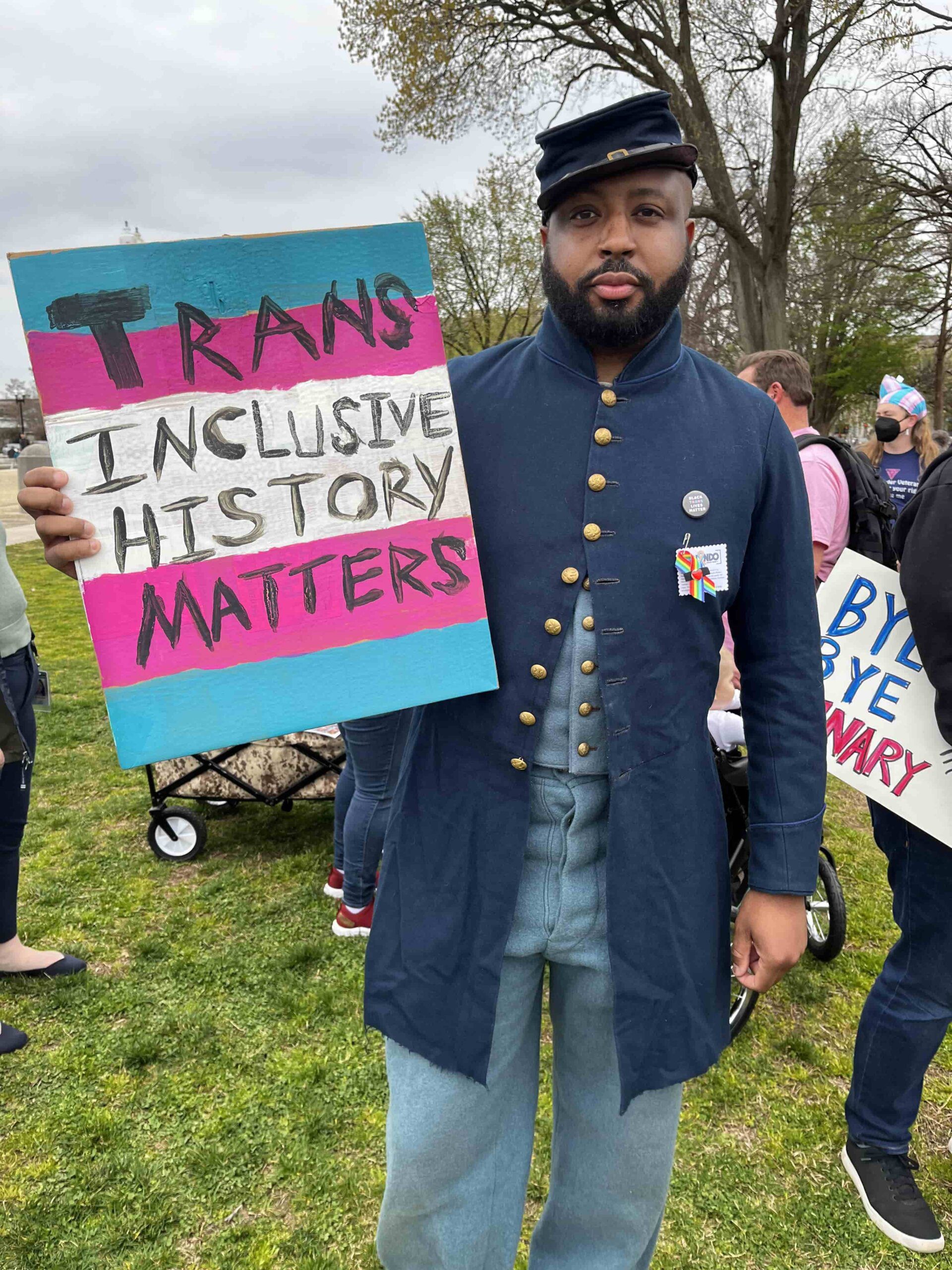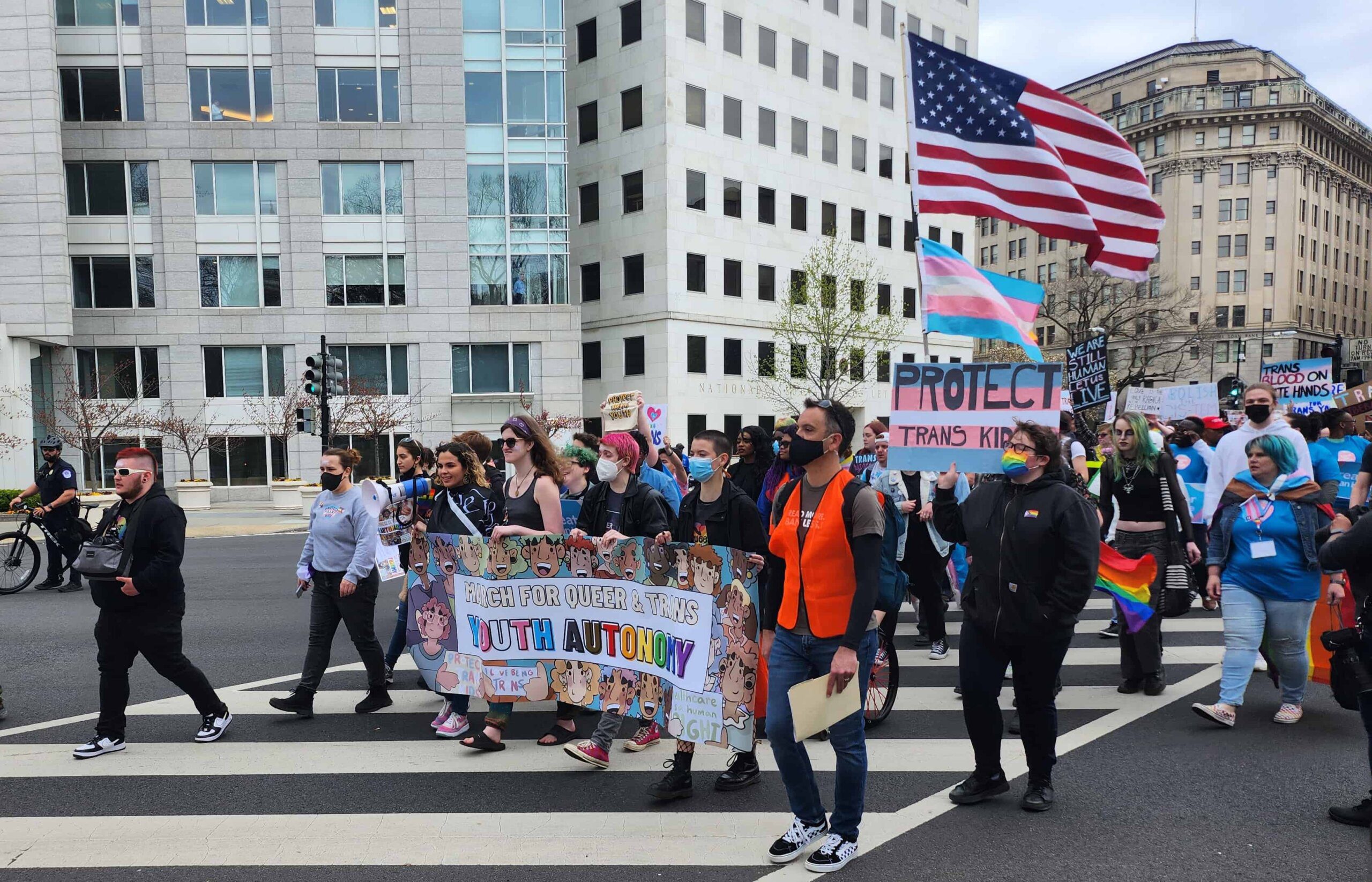Ever since Terra Byrne came out as trans more than 20 years ago, they’ve routinely attended LGBTQ2S+ rights protests around Washington, D.C. This year, the flood of state-level efforts to restrict trans rights and youth healthcare hit home especially hard.
“I grew up hearing stories from my mom about the friends she lost over the AIDS epidemic,” Byrne recounted. “The current attack on trans kids feels [like] a continuation of the stigma of the ’80s. And I’ve lost friends too. It feels like an intentional act by our governments to kill us.”
Byrne was one among hundreds of protesters across several states and Washington, D.C. who participated in the March for Queer and Trans Youth Autonomy demonstration, in honour of the International Trans Day of Visibility on March 31. Queer Youth Assemble, a youth-led non-profit that serves queer people under the age of 25, organized the effort as a counter-response to legislation introduced by Republican state lawmakers that would restrict gender-affirming care, drag performance and students’ conversation around sexual orientation and gender identity in schools.
According to the American Civil Liberties Union, over 430 of these anti-LGBTQ2S+ bills have been introduced nationwide in the 2023 legislative session. This also comes as the LGBTQ2S+ community continues to face an escalation of hate from conservative groups, particularly associations with violence and “groomer” rhetoric, and as trans people are over four times more likely to experience violent victimization, per a 2021 study from UCLA School of Law.
“The current attack on trans kids feels [like] a continuation of the stigma of the ’80s. And I’ve lost friends too. It feels like an intentional act by our governments to kill us.”
In Washington, D.C., protesters began their march at Columbus Circle and ended in a gathering near the Capitol Reflecting Pool. According to the Human Rights Campaign, which collaborated with Queer Youth Assemble to organize the event, the number of D.C. participants is estimated around the high hundreds.
Seventeen-year-old Alia Cusolito, a primary organizer and co-president of Queer Youth Assemble, delivered a keynote address listing the group’s demands for the safety of queer and trans youth and students nationwide.
“Codify Title IX to include sexuality, gender identity and gender expression,” they stated. “Support, strengthen and create a safe schools program for LGBTQ+ students nationally and statewide in departments of education.”
While marching to Capitol Hill as protesters chanted “Trans rights are human rights,” Greyson Marshall, a young trans person from Texas, told Xtra that his friends “had been hit really hard by the anti-trans bills and hate against drag artists back home.” This week alone, the Texas Senate approved Senate Bill 15, which prevents trans athletes from playing on sports teams of their preferred gender at public universities, and Senate Bill 162, which prohibits amending the sex on a minor’s birth certificate to match their gender identity.
“I’m friends with many active drag queens,” Marshall continued. “It’s upsetting and disappointing and infuriating that people can look at us, minding our own business, and then decide that we don’t have the right to do that. Being trans saved my life. It saved all our lives.”
These concerns over trans vulnerability extended to anxieties over potential violence that could descend upon events nationwide. While the Queer Youth Assemble organizers did not experience direct threats from counter-protesters, other Trans Day of Visibility events were canceled out of concern over participant safety, including some in D.C. and Nashville.
As protesters settled into Union Square, Xtra sat down with public historian and TikTok star Marvin-Alonzo Greer, who walked around in a Civil War-era Union Army uniform to honour Albert Cashier, a soldier understood as a trans man by many modern historians. Holding a sign that read “TRANS INCLUSIVE HISTORY MATTERS,” he explained that he participated in the march to support his trans partner, who was unable to make the event, and to emphasize the importance of historical education to ensure the safety of queer children.

Credit: Alina Kim/Xtra
“My demands for Congress are that they pass laws to protect our children,” Greer said. “Human rights are not up for debate. The draconian laws and education-related changes that are shoved through state agendas are doing nothing but harm.”
For several participants, the parade and march meant something more intimate—a reminder amid calls for violence against queer people that their community can gather and spread hope to the younger generation of trans people.
Oliver, a young Black non-binary activist from New York, controlled traffic as the protesters crossed Louisiana Avenue and approached the Capitol Reflecting Pool lawn. He felt compelled to help the youth organizers in D.C. because of his own lack of community support as a closeted child.
“I grew up in a household that told me, ‘No, you’re not going to be that.’ Many people also don’t respect my pronouns and assume I am cis,” Oliver said. “I’m here to say that wasn’t okay, and to let younger trans folks know that we deserve rights and acceptance.”
When asked what advice he would give to queer youth and young organizers, Dakota Lewis, a trans man from Maryland, blinked away tears. “It’s really scary, but it’s worth it. You’re stuck with us as family whether you like it or not, because we fucking love you,” Lewis joked. “It’s okay if you’re not ready to come out, and it’s okay if you feel alone. But even if you live just one day with your truth, know that you are loved.”


 Why you can trust Xtra
Why you can trust Xtra


